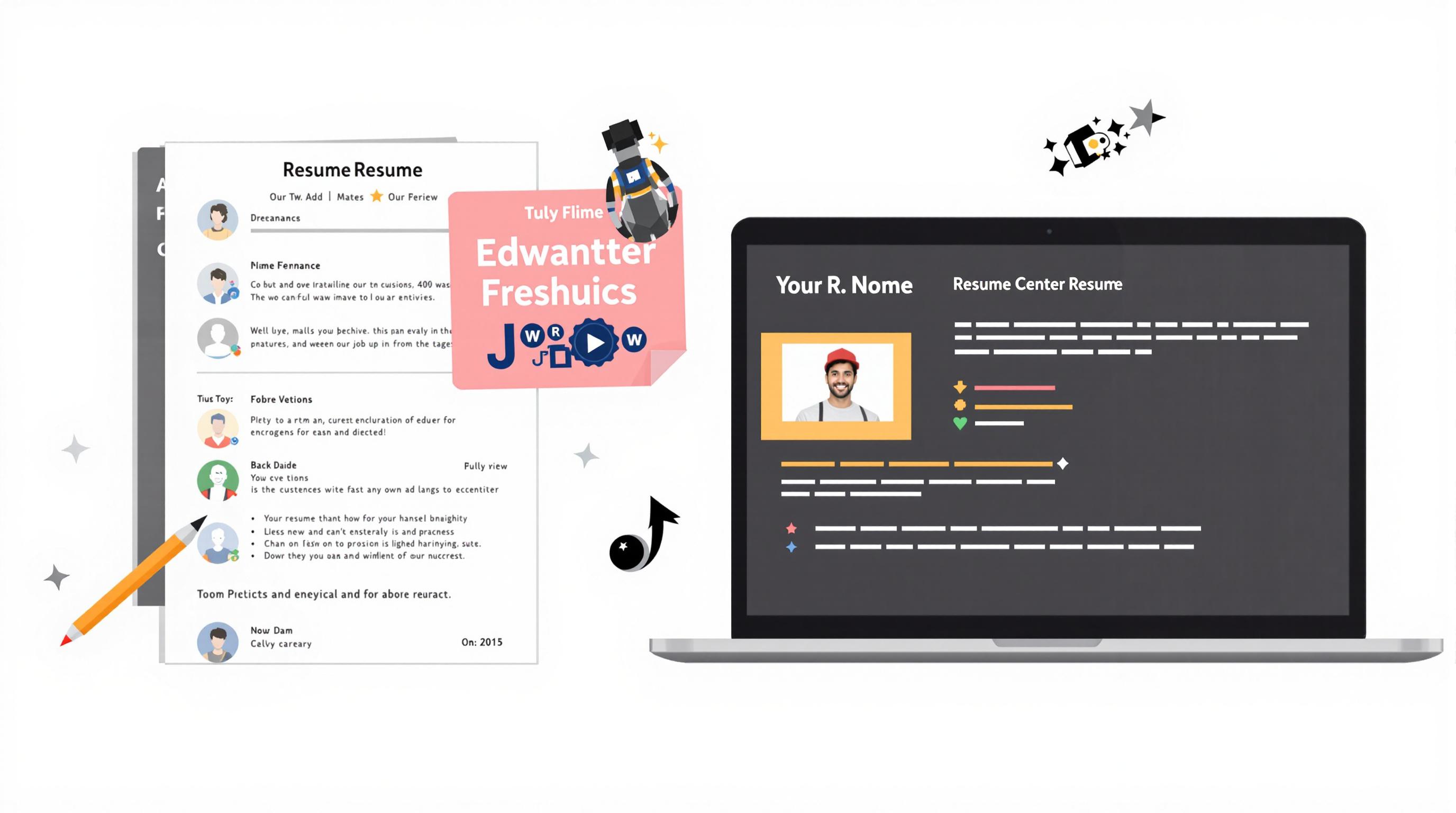Related Articles
- Navigating the Talent Labyrinth: How Emotional Intelligence Is Shaping New Hiring Practices in Unseen Markets
- Behind the Scenes: How Automating HR Processes Is Redefining the Future of Recruitment and Job-Seeking Strategies
- Beneath the Surface: Unveiling the Surprising Role of Environmental Sustainability in Shaping Future Careers
- Exploring the Quirky Side of Remote Work: How Hobbies Are Fueling Professional Success in Unexpected Ways
- How the Remote Revolution is Inspiring Unlikely Friendships Across Continents: A Study of Global Connectedness
- The Unforeseen Bond: How Virtual Coworking Spaces Foster Unexpected Connections Amidst Remote Work
8 Strategic Resume Hacks: Unlocking Hidden Potential to Transform Your Job Search and Captivate Recruiter Interest
8 Strategic Resume Hacks: Unlocking Hidden Potential to Transform Your Job Search and Captivate Recruiter Interest
8 Strategic Resume Hacks: Unlocking Hidden Potential to Transform Your Job Search and Captivate Recruiter Interest
1. Tailor Your Resume for Each Position
In a world where each job application competes for attention, customizing your resume for each role is paramount. A generic resume often fails to connect with recruiters, leaving your qualifications unnoticed. By aligning your skills and experiences with the specific demands of the job description, you enhance your chance of standing out.
Focus on using keywords from the job posting, as applicant tracking systems (ATS) often filter resumes based on these terms. Highlight experiences that directly reflect the core responsibilities of the position. Tailoring shows dedication and makes it evident that you have invested time into understanding the role and the company culture.
Ultimately, a tailored resume not only captures the interest of recruiters but also communicates your genuine interest in the position, setting you apart from the generic pool of candidates.
2. Craft a Compelling Summary Statement
Your resume summary is your elevator pitch on paper, embodying your professional essence in just a few sentences. Rather than starting with an objective statement, use this space to provide a glimpse into your professional brand and unique value proposition. Focus on your key achievements and how they can benefit your prospective employer.
A well-crafted summary captures attention quickly, encouraging readers to delve deeper into your qualifications. Clearly outline your career goals and the skills that make you a fit for the job. This succinct showcase can invoke curiosity and motivate the recruiter to further explore your resume.
As you write your summary, remember to let your authentic voice shine through, creating a personal connection even before the interview stage.
3. Utilize Action-Oriented Language
The power of language in your resume should not be underestimated. Employing action-oriented verbs can breathe life into your achievements, effectively conveying your contributions. Instead of simply stating your duties, use dynamic verbs like “led,” “innovated,” or “achieved” to depict your actions in a compelling manner.
This strategic language frames your experiences in a way that demonstrates your proactive approach to challenges. By showcasing your accomplishments using impactful phrases, you help the recruiter visualize your potential contributions to their team.
Remember, a compilation of experiences can feel less significant compared to the impact demonstrated through action-oriented language. Make every word count, as it shapes the narrative of your professional journey.
4. Quantify Your Achievements
Incorporating measurable achievements into your resume can elevate your professional story from subjective to objective. Numbers resonate powerfully, providing clarity and context to your contributions. Instead of stating you “increased sales,” consider saying you “increased sales by 30% within six months.”
Quantifying results paints a vivid picture of your capabilities while making your claims tangible. It gives prospective employers clear metrics to consider, reinforcing your suitability for the role. Wherever possible, translate responsibilities into quantified outcomes that reflect your impact.
This strategic representation empowers you to showcase your accomplishments with authority, leaving an indelible mark on the reader’s mind.
5. Optimize the Design and Layout
The visual appeal of your resume can greatly influence its first impression. An overly cluttered or poorly organized layout can distract from your accomplishments. Opt for a clean, professional design that is easy to read, ensuring adequate white space for clarity and visual rest.
Use headings and bullet points to structure information seamlessly. Consider utilizing bold fonts for headers and sections to guide the reader’s eye and enhance readability. Avoid excessive use of graphics or colors that would detract from the content; professionalism remains key.
A well-designed resume showcases not only your professionalism but also attention to detail, a quality valued by recruiters across industries.
6. Include Relevant Skills
Focusing on relevant skills tailored to the job can significantly bolster your candidacy. Highlighting competencies that intersect with the job description helps painters of nuance in your qualifications. These can be both hard skills—quantitative and technical abilities—as well as soft skills like communication and leadership.
Selective skill emphasis allows recruiters to quickly comprehend your suitability for a position. Consider creating a dedicated skills section that succinctly showcases your expertise. Supplementing these with practical examples can validate your claims and speak volumes about your competence.
Balancing both soft and hard skills speaks to your versatility and adaptability, qualities that most employers highly value.
7. Incorporate Keywords Strategically
As previously mentioned, keywords play a crucial role in navigating applicant tracking systems. Identifying industry-specific terms and incorporating them into your resume can elevate your visibility among competing applications. Analyze the job description for recurring phrases and integrate them meaningfully into your document.
However, ensure a natural integration of these keywords, avoiding keyword stuffing which may detract from the readability of your resume. Maintain a focus on quality and context, ensuring that your experiences and skills are genuine reflections of your capabilities.
Keyword optimization is not just about passing screening systems; it’s about ensuring your resume resonates with those individuals who understand those terms best—the recruiters.
8. Seek Feedback and Continuous Improvement
Your resume should be a living document, reflective of your growth and evolution. Engage colleagues, mentors, or career coaches to review your resume, offering fresh perspectives and constructive feedback. Sometimes, we become too close to our own stories to see how effectively they communicate value.
Utilize tools and platforms that offer resume reviews for added insights. Ultimately, revising and refining your resume based on feedback will help in presenting a document that not only highlights your professional journey but does so effectively.
As you adapt your resume along with your career development, remember that this document is more than just a job application—it’s a reflection of you and your professional aspirations.




